Definitive Feasibility Study for the Kakula Mine, and an updated Integrated Development Plan for multiple expansions of the entire Kamoa-Kakula mining licence, nearing completion
Surface stockpiles now contain an estimated 116,000 tonnes of ore grading 6.08% copper, plus 446,000 tonnes grading 2.73% copper, including satellite stockpiles at Kakula South and Kansoko
Kamoa-Kakula moves to level 2 of its COVID-19 safety measures, in line with lifting of restrictions by the DRC government
KOLWEZI, DEMOCRATIC REPUBLIC OF CONGO – Ivanhoe Mines (TSX: IVN; OTCQX:IVPAF) Co-Chairs Robert Friedland and Yufeng “Miles” Sun announced today that underground development at the Kakula Copper Mine continues to exceed expectations with more than 18.7 kilometres now complete, which is 5.5 kilometres ahead of schedule. In July, the mining team achieved 1,638 metres of underground development – 257 metres ahead of plan for the month.
The majority of the development headings at the Kakula Mine currently are traversing medium-grade sections of the orebody, with average grades ranging between 3% and 5% copper. Several development headings are in higher-grade zones averaging between 5% and 8% copper, and this ore is being placed on a dedicated, high-grade surface stockpile at Kakula North that currently totals approximately 116,000 tonnes grading an estimated 6.08% copper. The lower-grade surface stockpiles at Kakula North, Kakula South and Kansoko together contain an additional 446,000 tonnes grading an estimated 2.73% copper.
As Kakula’s underground development progresses over the next few months, the majority of the working areas are expected to transition into the higher-grade ore zones near the centre of the deposit that have copper grades approximately 5% to 8%.
The high-capacity ore conveyor system at the Kakula North declines, which has a capacity of 2,000 tonnes per hour, is undergoing final commissioning and is expected to begin continuous operations shortly. Once this happens, the ore mined in the northern portion of the Kakula Mine will be combined and be placed on a blended surface stockpile. The Kakula South and Kansoko declines are not equipped with conveyor systems; as such, the ore mined from these deposits will continue to be placed on separate surface stockpiles, based on copper grades.
First copper production at Kakula approximately one year away
Initial production at the Kakula Mine is scheduled for Q3 2021. Kakula is projected to be the world’s highest-grade major copper mine with an initial mining rate of 3.8 million tonnes per annum (Mtpa) at an estimated average feed grade in excess of 6% copper over the first five years of operation.
The Kakula Mine will have one of the most favourable environmental footprints of any tier-one copper mine. It will be powered by clean, renewable hydroelectricity and be among the world’s lowest greenhouse gas emitters per unit of copper produced. It also will have a relatively tiny surface footprint as approximately 55% of the mine’s tailings will be pumped back into underground workings.
The Kamoa-Kakula Project is unique as it combines ultra-high copper grades in thick, shallow and relatively flat-lying deposits – allowing for large-scale, highly-productive, mechanized underground mining operations.
More than 300 truckloads, consisting mainly of structural steel and equipment for Kakula’s initial 3.8-million-tonne-per-annum processing plant, are expected to arrive at the mine site before the end of August. Fabrication of the plant’s largest components – two ball mills, each measuring 9.75 metres (32 feet) long and 6.1 metres (20 feet) in diameter – has been completed at CITIC Heavy Industries’ factory in Luoyang, China, and the third and final shipment of ball mill components is expected to be on-site by the end of September.
“The construction team at Kakula, led by Mark Farren, Kamoa Copper’s CEO, has done a fantastic job of keeping the project moving ahead at a rapid pace despite the logistical challenges posed by COVID-19,” said Mr. Friedland. “With each passing month, we are getting increasingly confident that we could be producing copper at Kakula ahead of schedule.”
“We’re in a good place at the moment, with the vast majority of the major equipment needed to build the mine and processing plant already fabricated, and either at site, or en route to site. Full credit goes to our entire team for implementing and adhering to early and extraordinary measures to safeguard our workforce and mitigate the impact of COVID-19 on the mine development and construction operations,” Mr. Friedland added.
The Kamoa-Kakula Copper Project is a joint venture between Ivanhoe Mines (39.6%), Zijin Mining Group (39.6%), Crystal River Global Limited (0.8%) and the DRC government (20%).
Mark Farren, Kamoa Copper’s Chief Executive Officer (left), and Rochelle De Villiers (right), Kamoa Copper’s Co-Chief Financial Officer, with one of the mine’s new Sandvik 63-tonne haul trucks. Mr. Farren and Mr. De Villiers are key members of the mine’s on-site management team driving the project towards completion.
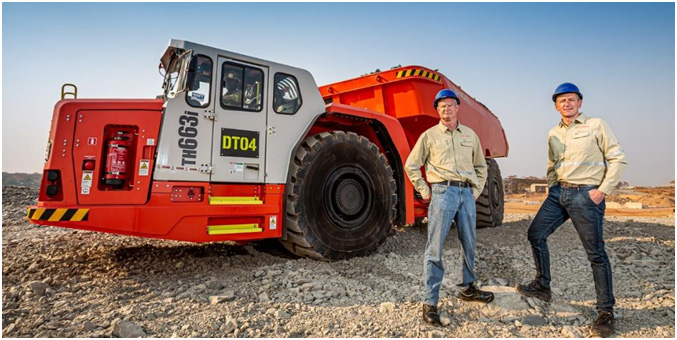
Several of the recently arrived truck loads of equipment for the Kakula Mine. An additional 300 truck loads are scheduled to arrive by the end of August.
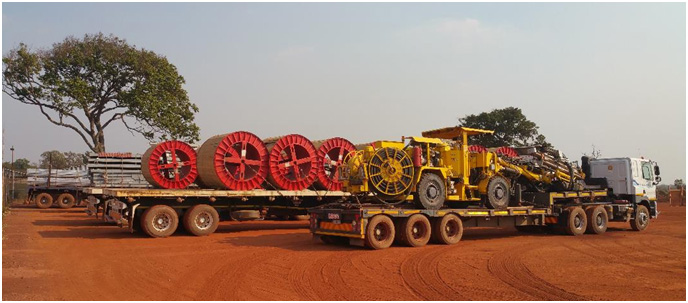
Aerial view of the Kakula Mine showing the tonnes and grade of the main pre-production stockpiles. The high-grade stockpile currently contains approximately 116,000 tonnes grading 6.08% copper, and the medium-grade stockpile currently contains approximately 325,000 tonnes grading 2.94% copper.
As underground development progresses at the Kakula and Kansoko mines over the next few months, the grade of the project’s three medium-grade stockpiles is forecast to increase to between 3% – 5% copper.
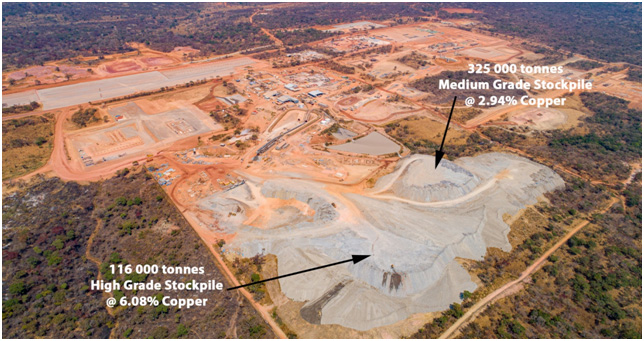
Kakula southern decline and medium grade ore stockpile currently containing approximately 75,000 tonnes grading 2.18% copper.
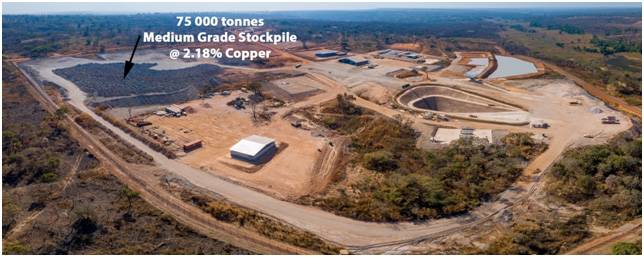
Kansoko decline and medium-grade ore stockpile currently containing approximately 46,000 tonnes grading 2.17% copper.
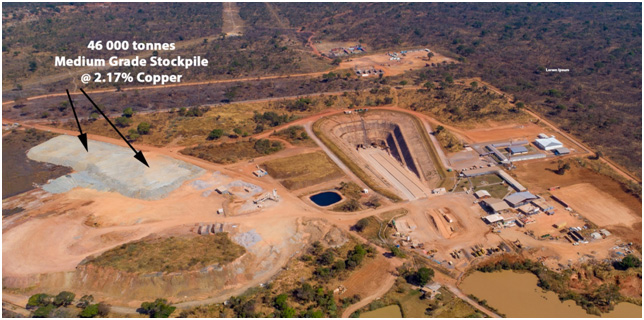
Kakula Mine development progressing towards zone of +8% copper in centre of deposit
Underground development of the Kakula Mine, the first of multiple near-surface copper deposits that are planned to be put into production on the 400-square-kilometre Kamoa-Kakula mining licence, is well ahead of schedule. Mine access drives 1 and 2 (interconnected, parallel tunnels that will provide access to ore zones) continue to advance towards the southern portion of the orebody.
Development also is well advanced on the eastern perimeter drives and the room-and-pillar mining area. Development from the southern portal has reached south access drives 1 and 2, with mining crews working to establish the connection of these drives with mine access drives 1 and 2 from the north side of the orebody. The northern and southern access drives are expected to be joined in Q4 2020.
Once the northern and southern access drives are connected, the majority of mining activities will focus on the initial drift-and-fill mining blocks in the centre of the Kakula deposit, where the average grade is higher than 8% copper. Drift-and-fill stoping is a highly-efficient form of underground mechanized mining and will allow the operation to recover significantly more tonnes from the orebody.
Underground mining also is taking place at the Kansoko Mine, located at the Kamoa deposit, approximately 10 kilometres north of the Kakula Mine. More than 220 metres of advancement was achieved at Kansoko during July by a young Congolese mining crew undergoing training. A second mining crew will be added at Kansoko in August 2020 as the project increases the pace of training new Congolese miners.
The construction of Kakula’s second permanent underground water-handling system is progressing well and commissioning is expected this month. The new system will add 800 litres per second of underground pumping capacity, bringing the total installed capacity to 1,400 litres per second. As mine development progresses, additional underground water dams are planned for the northern and southern perimeter drifts.
The independent Kakula definitive feasibility study (DFS) and an updated Integrated Development Plan for the entire Kamoa-Kakula mining complex is expected to be finalized shortly. The Integrated Development Plan will include details on the planned expansion phases for the greater Kamoa-Kakula mining complex, incorporating updates for mineral resources, production rates and economic analysis.
Basic engineering design and costing for Kamoa-Kakula’s planned Phase 2 expansion, taking production from 3.8 Mtpa to 7.6 Mtpa, also is complete. The scope of facilities for Phase 2 includes underground expansion at the Kakula Mine to reach an annual production rate of 6 Mtpa, the expansion of mining operations at the Kansoko Mine to a steady state 1.6 Mtpa, a second 3.8-Mtpa concentrator plant at Kakula, as well as associated surface infrastructure to support the expansion at the various sites.
Figure 1: The 13.3-kilometre-long Kakula Deposit showing the first five years of planned underground development and production (in the black box at the eastern end of the deposit) focused on the pink area containing average copper grades greater than 8% copper.
More detail of current underground development progress and planned development to the end of September 2020 and to the end of December 2020, is shown in figures 2, 3 & 4.
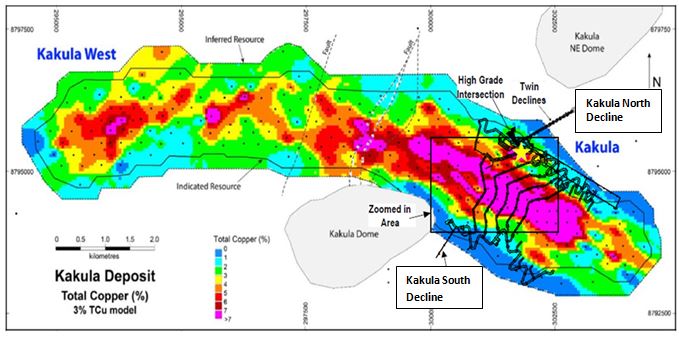
Figure 2: Underground development completed to the end of July (in black) and scheduled development (green, brown, blue & black) until September 30, 2020. Shown are the 3%, 5% and 8% copper contours and the location where the northern and southern access drives are scheduled to join in Q4 2020 (red star).
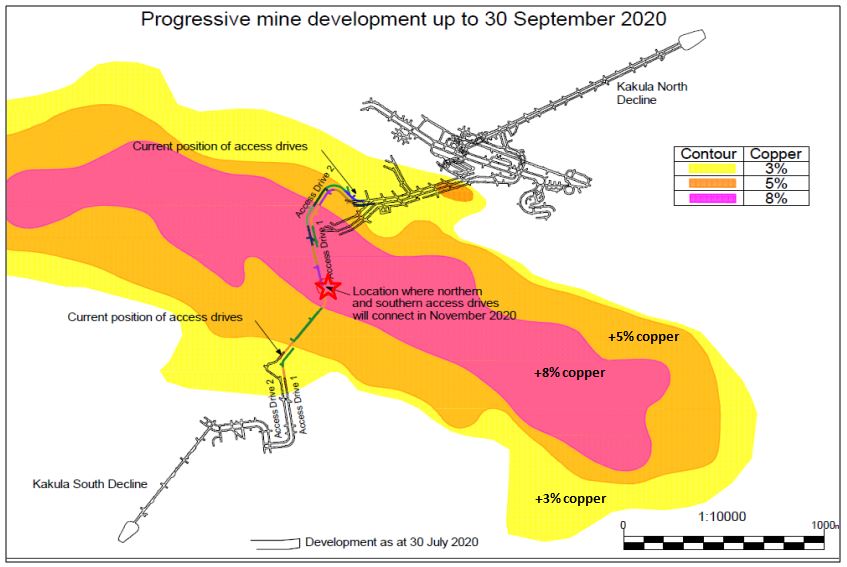
Figure 3: Underground development completed to the end of July (in black) and scheduled mine development over the three months ending December 31, 2020. Majority of the development during this period will be in the initial drift-and-fill mining area within Kakula’s high-grade zone (+8% copper).
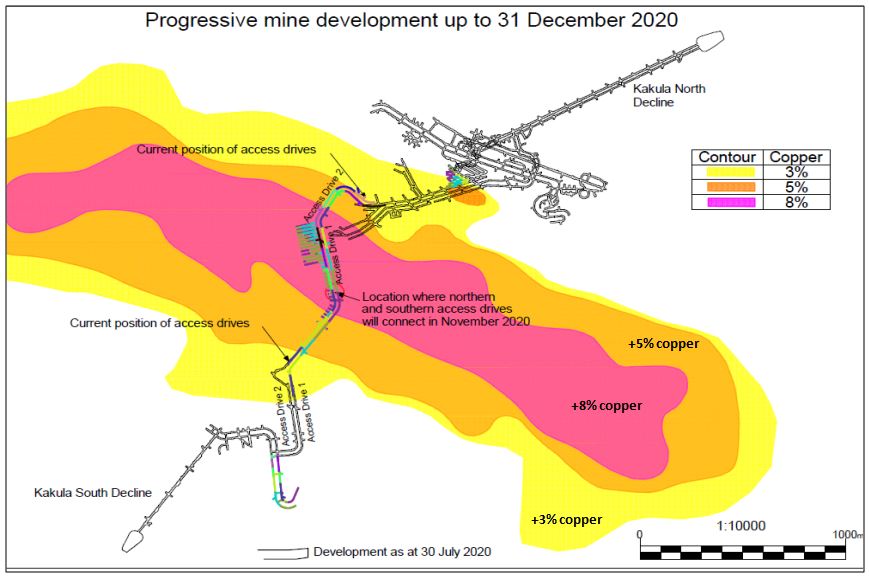
Figure 4: The eastern portion of Kakula Mine ─ representing less than half of the overall 13.3-kilometre-long Kakula Deposit ─ overlain on southern Manhattan Island to give a sense of the enormous scale of the underground operations.
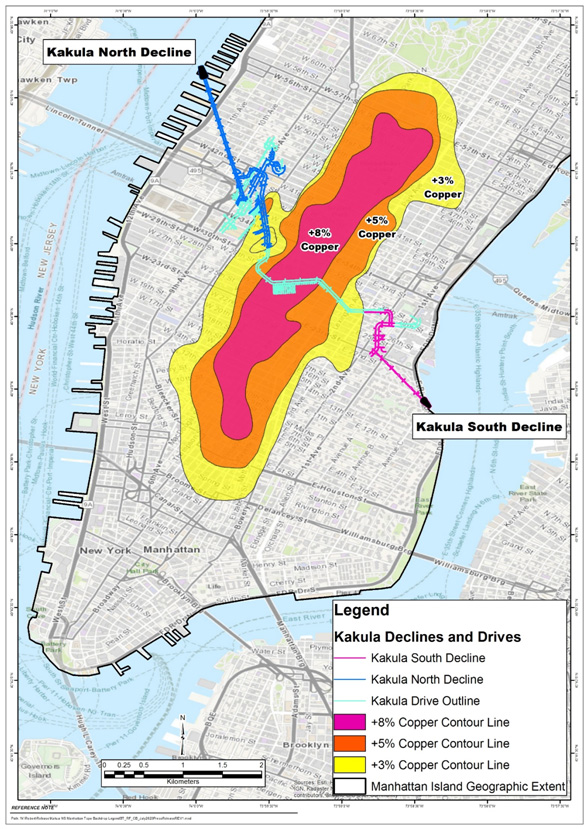
Geologist Kally Mbumba showing ultra-high-grade, chalcocite-rich ore at Kakula Mine. Chalcocite has the greatest percentage of copper of all the common sulphide-copper-bearing minerals ─ almost 80% copper by weight.
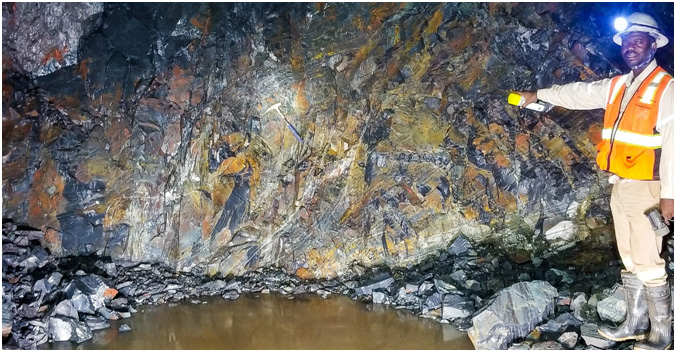
Development ore is loaded into a haul truck from one of Kakula’s two northern access drives. The northern access drives currently are mining ore averaging +5% copper, and soon will be entering the +8% copper zone near the centre of the Kakula deposit.
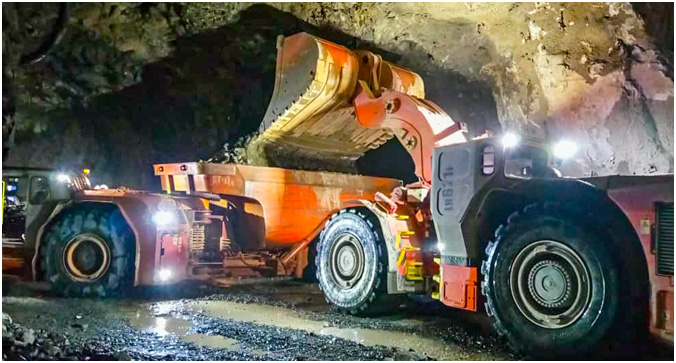
Blaster Polydor Numbi loading explosives into drilled blast holes at the face of one of Kakula’s 6-metres-high by 6-metres-wide access drives.
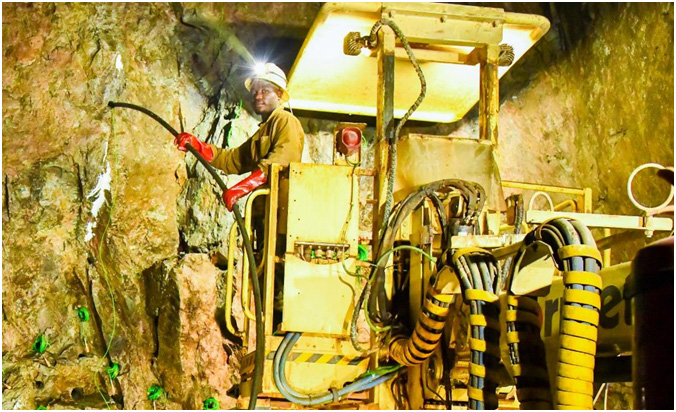
Construction on the processing plant and other surface infrastructure remains on track for initial production in Q3 2021
Construction of Kamoa’s 3.8-million Mtpa concentrator plant is progressing well, with more than 16,000 cubic metres of concrete being poured to date. Concrete bases for the ball mills, flotation plant and the concentrate thickener have been partially handed over to the mechanical contractor to commence installation work, and steel erection is currently underway in the flotation and thickener areas. Approximately 3,600 tonnes of structural steel had been shipped by the end of July.
Beijing-based CITIC Construction has been awarded the construction contract for Kakula’s phase 1 backfill paste plant. The backfill plant will be used to blend tailings from the processing plant with cement to produce paste backfill. The backfill will be pumped back into the mine and used to help support mined-out areas. Approximately 55% of the mine’s tailings will be sent back underground, significantly reducing the surface tailings storage.
The Electrical & Instrumentation contract was recently awarded to T3 Construction, a leading South African construction company. This is the final major construction contract required for Kakula’s processing and backfill plants.
Construction of the tailings dam has commenced and is progressing well. The aim is to complete most of the earthworks before the rainy season starts in November.
Ongoing construction of Kakula’s initial 3.8 Mtpa processing plant.
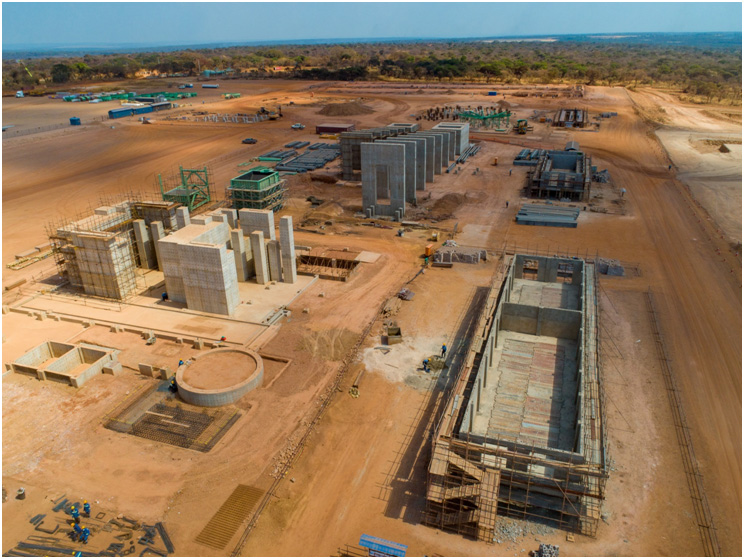
Next two pictures showing the first flotation-cell grillage being lowered into place – a 44-tonne lift.
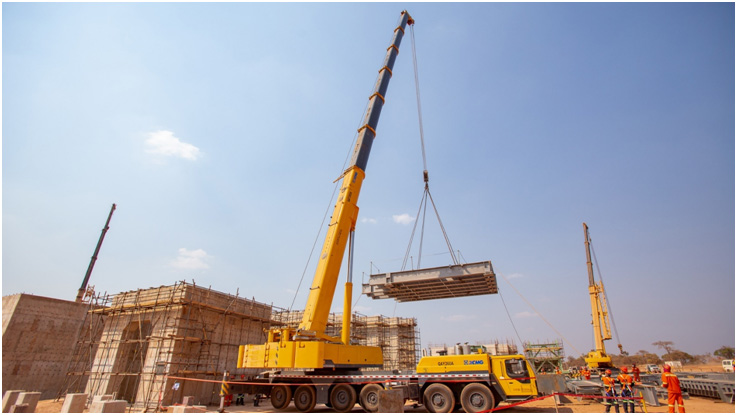
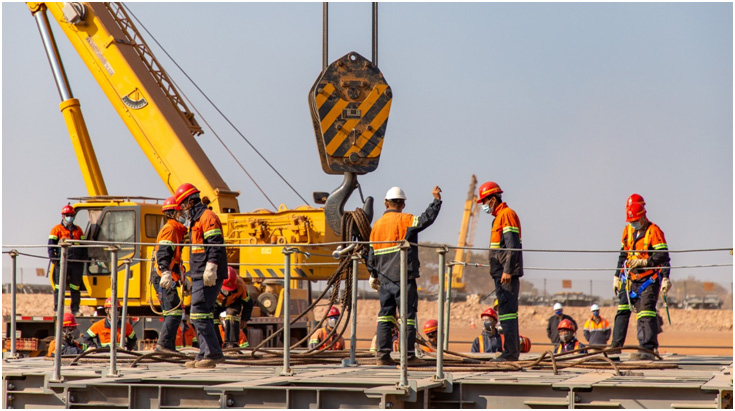
Wei Sun, paint foreman with Modern Heavy Industries, based in Taicang, China, polishing structural steel beams that will be used in Kakula’s processing plant.
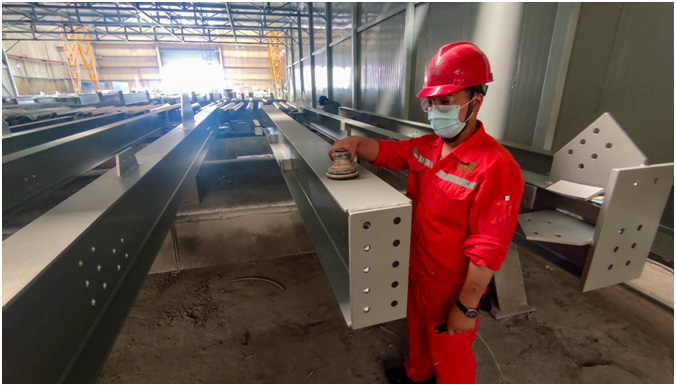
Discussions underway for the marketing of Kakula’s copper concentrates
Kamoa-Kakula is in detailed discussions with a number of parties with respect to the marketing and smelting of its copper concentrates. Kakula is expected to produce an extremely high-grade and clean copper concentrate that will be highly coveted by copper smelters around the world. Metallurgical test work indicates that the Kakula concentrates contain extremely low arsenic levels by world standards – approximately 0.01%.
“In roughly one year, the Kakula Mine will be producing extremely high-grade concentrate containing over 55% copper with essentially zero arsenic − it will be the ‘beluga caviar’ of copper concentrates,” Mr. Friedland commented. “We expect that there will be intense competition amongst copper traders and smelters to acquire the product before our joint-venture with Zijin Mining builds our state-of-the-art, direct-to-blister smelter.”
Clean, sustainable hydro-electric power for Kamoa-Kakula
Construction activities at the Mwadingusha hydro-electric power plant, where all six turbines are being replaced, is progressing well; as is the associated 220-kilovolt (kV) infrastructure to supply Kamoa-Kakula with clean hydro-power. The mine is scheduled to be energized with permanent 220kV hydro-generated power in early 2021, well in time for first copper production.
The temporary construction power supply for the Kakula Mine was recently upgraded, including the commissioning of five new 2MW generators to provide back-up power, and the installation of an 18MW/120kV mobile substation to increase the capacity of grid power available at the mine. This will provide sufficient power until the main 220kV power supply is energized.
Construction of the 220kV supply infrastructure is in progress, including: a new 220kV distribution sub-station for the power utility (SNEL); and a new 35-kilometre, 220kV power line and a consumer substation at Kakula with two 80MW/220kV transformers.
Aerial view of the Mwadingusha dam and hydro-electric power plant that will soon be delivering 72 megawatts (MW) of clean, sustainable hydroelectricity to the national grid.
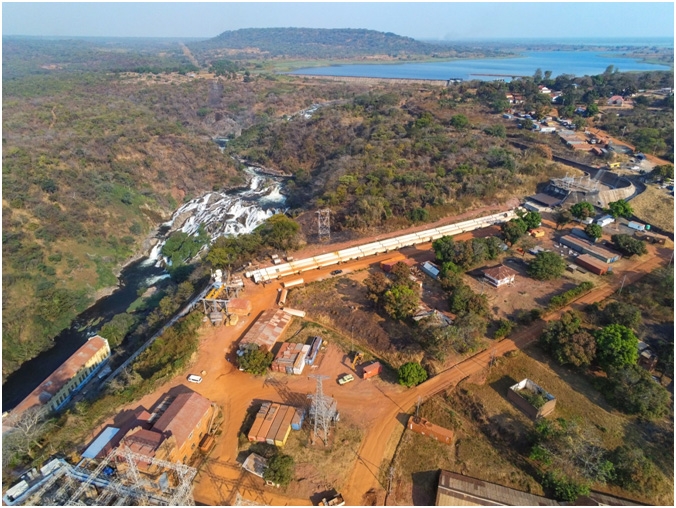
Pile rigging for a tower foundation for the new 35-kilometre, 220-kilovolt power line that will deliver clean, sustainable hydro-electricity from the national grid to the Kamoa-Kakula Project.
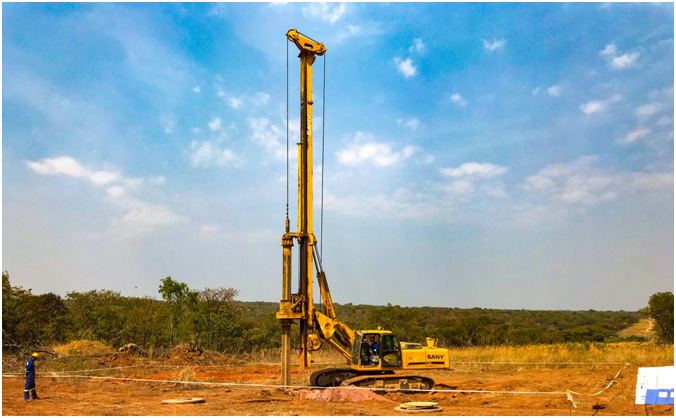
Kamoa-Kakula’s COVID-19 readiness initiatives focused on risk mitigation
In accordance with new health guidelines from the DRC government and in line with the country’s lifting of restrictions, Kamoa-Kakula lowered its quarantine and lockdown measures from level 3 to level 2 on July 27th. This means that the mine’s Congolese workforce have gone back to normal rotation. Rigorous testing, physical distancing, wearing face masks, frequent hand washing and contact tracing measures are still in place to protect the safety and health of the workforce and community members. All expatriate employees are still required to quarantine for two weeks upon arrival at Kamoa-Kakula.
In July, the Kamoa-Kakula Project donated 10,000 Covid-19 rapid test kits to local community health clinics and placed an order for 15,000 fabric face masks for donation to local communities.
As part of Kamoa-Kakula’s COVID-19 readiness initiatives, the project has procured a polymerize chain reaction (PCR) device from German-based Bosch (a similar device to the GeneXpert). The device arrived on-site at the beginning of July, with an initial supply of 500 tests. The device’s capacity is 15 tests per 24-hour period.
PCR tests are used to directly detect the presence of the genomic material of SARS-COV-2, rather than the presence of the body’s immune response, or antibodies. By detecting viral RNA, which will be present in the body before antibodies form or symptoms of the disease are present, the tests can tell whether or not someone has the virus very early on.
Early detection of potential cases based on symptoms and contact tracing is imperative.
PCR tests give the project’s medical team a good indication of who is infected. This allows for fast isolation, and contact tracing of potential additional cases for quarantine.
The project has established a COVID-19 isolation facility at the Kamoa camp. Any potential symptomatic patients are moved to this facility, where they will be isolated, tested and treated. Once the patient has recovered and is deemed no longer infectious, they can return to work only after an additional quarantine period determined by the project’s medical staff in dedicated quarantine.
As the pandemic evolves, the medical team at Kamoa-Kakula is purposefully reviewing and updating its risk mitigation protocols. The project’s preventative measures are at the highest international standards and if there was a case internally, the risk of spreading or cross-contamination is very low.
Qualified Persons
Disclosures of a scientific or technical nature regarding development scenarios at the Kamoa-Kakula Project in this news release have been reviewed and approved by Steve Amos, who is considered, by virtue of his education, experience and professional association, a Qualified Person under the terms of NI 43-101. Mr. Amos is not considered independent under NI 43-101 as he is the Head of the Kamoa Project. Mr. Amos has verified the technical data disclosed in this news release.
Other disclosures of a scientific or technical nature in this news release have been reviewed and approved by Stephen Torr, who is considered, by virtue of his education, experience and professional association, a Qualified Person under the terms of NI 43-101. Mr. Torr is not considered independent under NI 43-101 as he is the Vice President, Project Geology and Evaluation. Mr. Torr has verified the other technical data disclosed in this news release.
The stockpile grade estimates contained in this release are based upon bulk ore sampling from underground headings. Sampling is done on each heading every second blast and three 5-kilogram samples are taken. The samples are pulverized at the project’s onsite laboratory and analyzed used using a portable XRF (pXRF) instrument. Kamoa Copper has routinely analyzed its exploration drill core for copper using pXRF, in addition to analysis at a commercial laboratory using four acid digest and ICP-OES. This data has demonstrated that pXRF results can be relied upon for grade control and run-of-mine sampling.
Ivanhoe has prepared a current, independent, NI 43-101-compliant technical report for the Kamoa-Kakula Project, which is available on the company’s website and under the company’s SEDAR profile at www.sedar.com:
- The Kamoa-Kakula 2020 Resource Update dated March 25, 2020, prepared by OreWin Pty Ltd., Wood plc, DRA Global, SRK Consulting (South Africa) (Pty) Ltd and Stantec Consulting International LLC.
The technical report includes relevant information regarding the assumptions, parameters and methods of the mineral resource estimates on the Kamoa-Kakula Project cited in this news release, as well as information regarding data verification, exploration procedures and other matters relevant to the scientific and technical disclosure contained in this news release.
Information contacts
Investors: Bill Trenaman +1.604.331.9834 / Media: Matthew Keevil +1.604. 558.1034
Forward-looking statements
Certain statements in this release constitute “forward-looking statements” or “forward-looking information” within the meaning of applicable securities laws. Such statements and information involve known and unknown risks, uncertainties and other factors that may cause the actual results, performance or achievements of the company, its projects, or industry results, to be materially different from any future results, performance or achievements expressed or implied by such forward-looking statements or information. Such statements can be identified by the use of words such as “may”, “would”, “could”, “will”, “intend”, “expect”, “believe”, “plan”, “anticipate”, “estimate”, “scheduled”, “forecast”, “predict” and other similar terminology, or state that certain actions, events or results “may”, “could”, “would”, “might” or “will” be taken, occur or be achieved. These statements reflect the company’s current expectations regarding future events, performance and results and speak only as of the date of this release.
Such statements include without limitation, the timing and results of: (i) statements regarding the Definitive Feasibility Study for the Kakula Mine, and an updated Integrated Development Plan for multiple expansions of the entire Kamoa-Kakula mining licence, expected to be issued shortly; (ii) statements regarding as Kakula’s underground development progresses over the next few months, the majority of the working areas are expected to transition into the higher-grade ore zones near the centre of the deposit that have copper grades approximately 5% to 8%; (iii) statements regarding initial production at the Kakula Mine is scheduled for Q3 2021; (iv) statements regarding Kakula is projected to be the world’s highest-grade major copper mine with an initial mining rate of 3.8 million tonnes per annum (Mtpa) at an estimated average feed grade in excess of 6% copper over the first five years of operation; (v) statements regarding the Kakula Mine will have one of the most favourable environmental footprints of any tier-one copper mine; (vi) statements regarding the Kakula Mine will be powered by clean, renewable hydroelectricity and be among the world’s lowest greenhouse gas emitters per unit of copper produced; (vii) statements regarding Kakula will have a relatively tiny surface footprint as approximately 55% of the mine’s tailings will be pumped back into underground workings; (viii) statements regarding more than 300 truckloads, consisting mainly of structural steel and equipment for Kakula’s initial 3.8-million-tonne-per-annum processing plant, are expected to arrive at the mine site before the end of August; (ix) statements regarding the third and final shipment of ball mill components is expected to be on-site by the end of September; (x) statements regarding as underground development progresses at the Kakula and Kansoko mines over the next few months, the grade of the project’s three medium-grade stockpiles is forecast to increase to between 3% – 5% copper; (xi) statements regarding the northern and southern access drives at Kakula are expected to be joined in Q4 2020; (xii) statements regarding in roughly one year, the Kakula Mine will be producing extremely high-grade concentrate containing over 55% copper with essentially zero arsenic; and (xiii) statements regarding the Kakula mine is scheduled to be energized with permanent 220kV hydro-generated power in early 2021.
As well, all of the results of the pre-feasibility study for the Kakula copper mine and the updated and expanded Kamoa-Kakula Project preliminary economic assessment constitute forward-looking statements or information, and include future estimates of internal rates of return, net present value, future production, estimates of cash cost, proposed mining plans and methods, mine life estimates, cash flow forecasts, metal recoveries, estimates of capital and operating costs and the size and timing of phased development of the projects. Furthermore, with respect to this specific forward-looking information concerning the development of the Kamoa-Kakula Project, the company has based its assumptions and analysis on certain factors that are inherently uncertain. Uncertainties include: (i) the adequacy of infrastructure; (ii) geological characteristics; (iii) metallurgical characteristics of the mineralization; (iv) the ability to develop adequate processing capacity; (v) the price of copper; (vi) the availability of equipment and facilities necessary to complete development; (vii) the cost of consumables and mining and processing equipment; (viii) unforeseen technological and engineering problems; (ix) accidents or acts of sabotage or terrorism; (x) currency fluctuations; (xi) changes in regulations; (xii) the compliance by joint venture partners with terms of agreements; (xiii) the availability and productivity of skilled labour; (xiv) the regulation of the mining industry by various governmental agencies; (xv) the ability to raise sufficient capital to develop such projects; (xiv) changes in project scope or design, and (xv) political factors.
Forward-looking statements and information involve significant risks and uncertainties, should not be read as guarantees of future performance or results and will not necessarily be accurate indicators of whether or not such results will be achieved. A number of factors could cause actual results to differ materially from the results discussed in the forward-looking statements or information, including, but not limited to, the factors discussed below and under “Risk Factors”, and elsewhere in this release, as well as unexpected changes in laws, rules or regulations, or their enforcement by applicable authorities; the failure of parties to contracts with the company to perform as agreed; social or labour unrest; changes in commodity prices; and the failure of exploration programs or studies to deliver anticipated results or results that would justify and support continued exploration, studies, development or operations.
Although the forward-looking statements contained in this release are based upon what management of the company believes are reasonable assumptions, the company cannot assure investors that actual results will be consistent with these forward-looking statements. These forward-looking statements are made as of the date of this release and are expressly qualified in their entirety by this cautionary statement. Subject to applicable securities laws, the company does not assume any obligation to update or revise the forward-looking statements contained herein to reflect events or circumstances occurring after the date of this release.
The company’s actual results could differ materially from those anticipated in these forward-looking statements as a result of the factors set forth below in the “Risk Factors” section in the company’s Q1 2020 MD&A and its current annual information form.


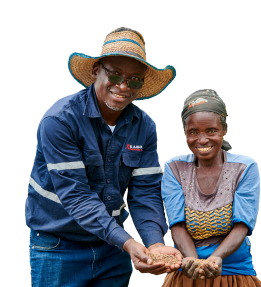
 English
English Français
Français 日本語
日本語 中文
中文